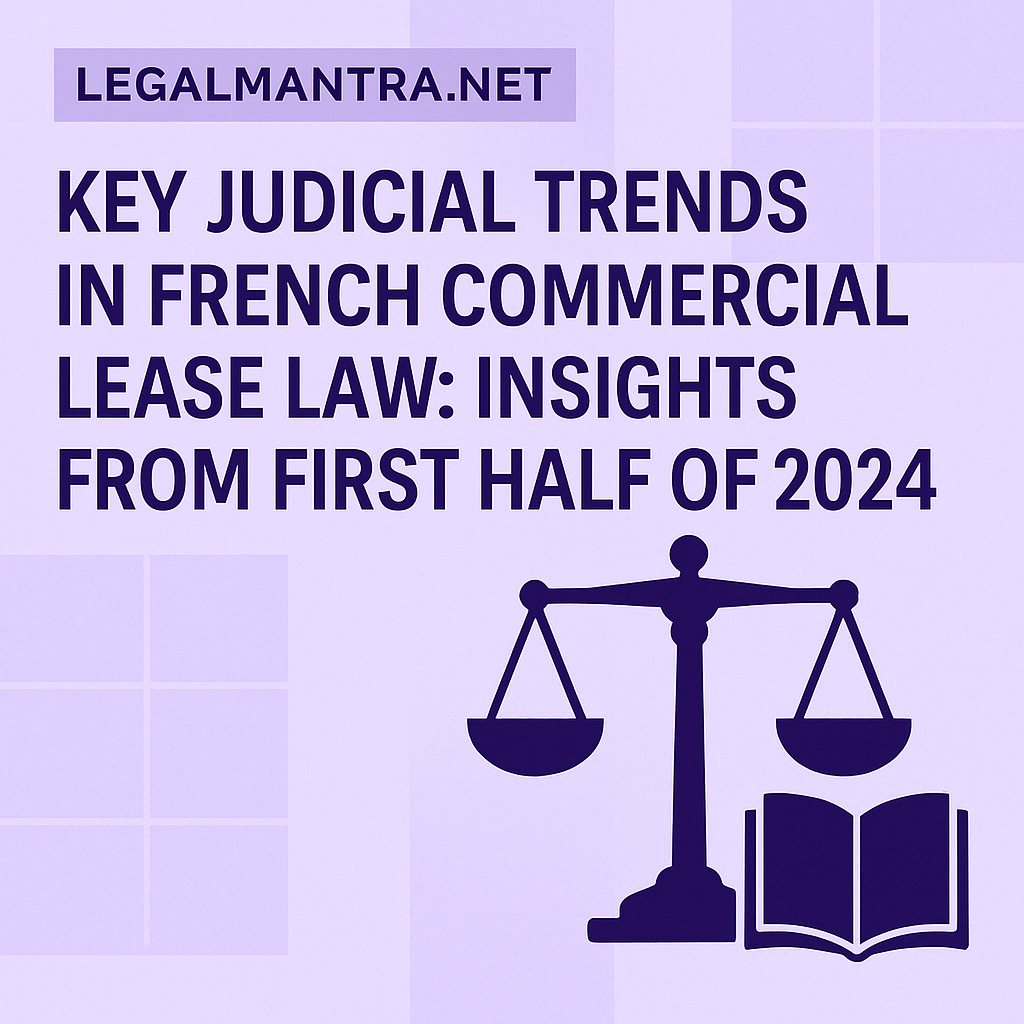View News
Key-Judicial-Trends-in-French-Commercial-Lease-Law-Insights

Introduction
French commercial lease law continues to evolve with increasing judicial scrutiny and nuanced interpretations by the Cour de cassation (French High Court). The first half of 2024 delivered a series of impactful rulings that address core aspects of leasing law—from termination notices and rent reassessments to the enforceability of subleases and the legal consequences of COVID-era disruptions. These decisions not only refine the interpretation of statutory provisions but also serve as crucial guidance for landlords, tenants, real estate investors, and legal professionals operating in the French market.
This article synthesizes these recent court decisions and distills practical takeaways for stakeholders navigating the complexities of commercial leasing in France.
1. Termination Notices and Eviction Rights
French courts reaffirmed that landlords must tread carefully when issuing notices of lease termination. A noteworthy decision emphasized that when a landlord proposes to renew a lease but with materially altered terms (except rent), such a proposal is effectively treated as a refusal to renew—thus triggering the tenant’s right to receive eviction compensation. This interpretation underscores the legal protection afforded to tenants under commercial lease statutes.
Takeaway: Substantive changes in lease terms upon renewal can be construed as termination, entitling tenants to indemnities.
2. Nature of Occupation: Lease vs. Temporary Agreement
Another pivotal ruling clarified that short-term or précaire occupation agreements do not qualify as commercial leases. Consequently, the legal duties applicable to leases—such as delivering the property fit for use—do not extend to such occupants. Liability in such cases arises only from specific contractual breaches, not from general lease obligations.
Takeaway: Businesses using temporary premises under precarious agreements have limited legal protection compared to lessees.
3. Rental Value and Rent Capping
The courts have shown willingness to override the statutory rent cap during lease renewals when there’s significant evolution in local commercial dynamics that positively impacts the tenant’s business. In such cases, rent can be reset to reflect current market value rather than being limited by capping mechanisms.
Takeaway: Landlords can seek higher renewal rents if local market conditions have significantly improved.
4. Behavioral Misconduct and Immediate Termination
A lessee's peaceful occupation of leased premises is a protected right. If the landlord (or their representative) engages in conduct that gravely violates this right, the court may permit immediate lease termination without requiring a prior formal notice.
Takeaway: Tenant safety and quiet enjoyment remain judicial priorities; serious misconduct by landlords can justify abrupt termination.
5. Procedural Compliance: A Litigator's Concern
In matters concerning rent disputes, the Court reiterated the importance of procedural formalities. Failure to submit required legal documents prior to filing a suit before the commercial rent judge can render the suit inadmissible.
Takeaway: Procedural diligence is not optional; it’s foundational to successful lease-related litigation.
6. Impact of Public Works and Jurisdictional Boundaries
When public works damage leased commercial premises, even if a lease exists between the public entity and the tenant, compensation claims fall under the jurisdiction of administrative courts—not civil courts.
Takeaway: Leaseholders impacted by public infrastructure projects must approach administrative courts for relief.
7. COVID-19 and Lease Enforcement
Courts continue to interpret COVID-19-related contract disputes narrowly. Clauses suspending rent payments were not enforceable where the leased premises remained physically usable, even if operations were impacted by lockdown rules.
Takeaway: Pandemic-related losses do not automatically excuse rent payments unless the property itself became unusable.
8. Subletting and Tenant Rights
French jurisprudence clarified that even when subletting is done without the landlord’s consent, the arrangement between the main tenant and subtenant remains valid as long as peaceful use of the premises continues. However, this does not bind the landlord.
Takeaway: Unauthorized subletting may not affect landlord rights but remains binding between tenant and subtenant.
9. Tax and Charges: Only What's Clearly Stated
Taxes like household waste collection charges can be passed on to tenants only if explicitly included in the lease agreement. Broadly worded charge clauses are insufficient for recovering such levies.
Takeaway: Landlords must draft charge clauses with precision if they intend to recover municipal taxes from tenants.
10. Lessee’s Right to Remain Post-Termination
A lessee who is owed an eviction indemnity has the legal right to continue occupying the premises under the expired lease terms until the indemnity is paid.
Takeaway: Tenants have extended rights of occupation where eviction compensation is due.
11. Miscellaneous Key Rulings
-
Night Work in Shopping Centres: Lessees are not obligated to follow center-wide decisions requiring night operations if those hours conflict with labor laws.
-
Fraud and Limitation Periods: Allegations of fraud can suspend the limitation periods for lease-related claims.
-
Binary Rent Clauses: Even in variable rent arrangements, courts may intervene to reset rent if both parties implicitly intended to allow judicial review.
-
Lease Assignment Post-Sale: Buyers aware of an existing lease before purchase are bound by its terms, and tenants can claim undue payments from original lessors.
Conclusion
These rulings from early 2024 collectively emphasize the French judiciary’s firm stance on tenant protection, good faith enforcement, clarity in contractual drafting, and procedural discipline. Whether you are negotiating a lease, managing commercial premises, or litigating a dispute, keeping abreast of these evolving interpretations is essential.
At Legal Mantra, we continue to monitor and decode international leasing trends to offer accessible insights to the Indian and global business communities.
Disclaimer: This article is a paraphrased summary and legal commentary based on publicly available court decisions referenced in K&L Gates’ France Real Estate Alert (October 2024). It is intended for educational and informational purposes only and does not constitute legal advice.

